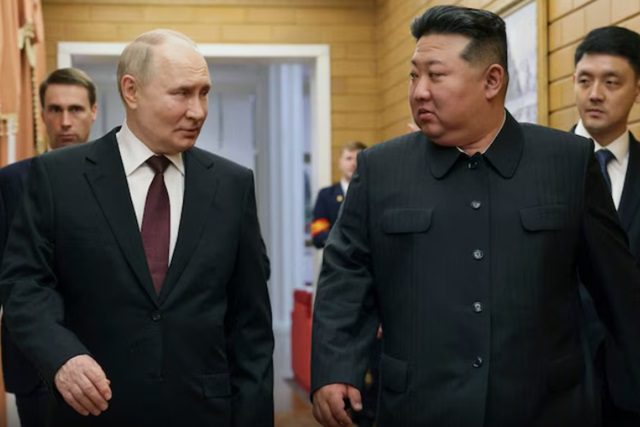BTN News: On June19 Russia’s President Vladimir Putin performed a rare diplomatic maneuver and visited North Korea on a “friendly states” level, which is strategically important for both countries having wide scale of repercussions. The meeting fits a pattern of Russia and North Korea closely coordinating their positions, as two of the world’s most heavily sanctioned countries both on the outs with much of the industrialized world. The two are nuclear states – Russia is a registered nuclear power, while North Korea is reported to have a secret (though not explicitly denied) capability.
…and Russia is the largest country on Earth, and has a permanent seat on the UN Security Council… North Korea is more isolated, far poorer and less involved in global economic ties but with heavy weapons capacity and with disruptive capability. Pyongyang has historically gained help from Moscow and Beijing, balancing its strategic ties between the 2 as circumstances have dictated.
While Russia and North Korea get along better with each other than Pyongyang does with Beijing, due to the former’s nuclear aspirations, there has not always been good blood between them. But recent geopolitical changes – including particularly the worsening of relations between Moscow and the West over Ukraine – have led to a shift in alliances.
The visit reciprocated Kim’s trips to Russia, as the leaders signed a declaration that included a combined 2.000-word document with an agreement on comprehensive strategic partnership. Traditionally the focus of such a pact would be mutual defense agreements, altering the regional security puzzle. But the talks went well beyond that, covering energy cooperation, trade and investment, and cultural exchanges as they sealed a supposedly comprehensive partnership in late June to establish a robust alliance through global tests.
The offices in Western capitals are worried that increased tension on the Korean peninsula might have wider global implications. The visit not only keeps Kim feeling closer to the international legitimation he craves, but also helps defy current sanctions regimes enforced on North Korea by both undermining them(through the backdoor) and thus supplying Moscow with a line of defense in an ongoing conflict.
With geopolitical fault lines widening, the emerging Moscow-Pyongyang axis stands as a competitor to Western-oriented power relations, reflecting broader global rearrangements. What these recent moves by Russia and North Korea reveal is the impact of changing power dynamics on international relations amid uncertainty.
It comes at a critical juncture in world politics, shifting the balance of power across Asia and even further. With alliances changing and lines being drawn in the sand, the fallout from Putin’s attempt to reach out to North Korea echoes far beyond just a diplomatic flurry of activity.


